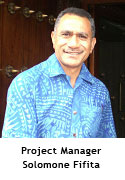
| PROGRAMMES | PROE | PROJECTS | PUBLICATIONS, LIBRARY and IRC | SITE MAP | SPREP FORUMS | WEBMAIL - Global / Local | HOME
PIGGAREP |
|
| > | Top |
| > | PIREP Documents |
| > | Interventions |
| > | PIGGAREP Documents |
| > | PIGGAREP Partners |
| > | About PIGGAREP |
| Search |
Home > PIGGAREP > About PIGGAREP
The Pacific Island Countries (PICs) are among the most vulnerable countries in the world to the adverse effects of climate change - the very existence of some PICs is threatened by climate change. Climate Change is a result of the concentration of greenhouse gases (GHG) like CO2 in the atmosphere. CO2 is released into the atmosphere when fossil fuels are burnt.
While the PICs continue to rely heavily on fossil fuels and only 30% of the population on average has access to electricity, they at the same time have some of the highest renewable energy (RE) potential per capita.
Offloading oil drums. (Photo: SPREP)
RE can reduce the PICs' dependence on fossil fuel thereby reducing the growth rate of GHG emissions from fossil fuel use. In addition, it can provide cleaner, more reliable and cost-effective energy services that are needed for the sustainable development of the PICs. However, this has been hindered / constrained by many barriers.
The PIGGAREP is a product of a Global Environment Facility (GEF) and United Nations Development Programme (UNDP) - funded preparatory exercise, the Pacific Islands Renewable Energy Project (PIREP). The PIREP was completed in 2006 and the implementation of the PIGGAREP commenced in 2007.
The global environment and development goal of PIGGAREP is the reduction of the growth rate of GHG emissions from fossil fuel use in the PICs through the removal of the barriers to the widespread and cost effective use of feasible RE technologies. The specific objective of the project is the promotion of the productive use of RE to reduce GHG emission by removing the major barriers to the widespread and cost-effective use of commercially viable RE technologies (RETs).
Solomon Islands. (Photo: SPREP)
The successful implementation of the PIGGAREP is estimated to reduce CO2 emissions by at least 30% by 2015 as compared to that in the Business as Usual scenario.
The PIGGAREP Team
 The
PIGGAREP is funded by the GEF and co-financing partners. The
UNDP Multi-country Office at Samoa is the Principal Project
Representative while the Secretariat of the Pacific Regional
Environment Programme (SPREP) is the Implementing Partner.
The
PIGGAREP is funded by the GEF and co-financing partners. The
UNDP Multi-country Office at Samoa is the Principal Project
Representative while the Secretariat of the Pacific Regional
Environment Programme (SPREP) is the Implementing Partner.
The overall direction and management of the PIGGAREP is by a Project Steering Committee (PSC) comprising 3 representatives from UNDP (Samoa, Fiji and PNG), a representative of the SPREP Director, 4 representatives (Fiji, Tonga, Tuvalu and Vanuatu) from the 11 participating PICs and IUCN Oceania as a co-financing and collaborating partner.
A PIGGAREP Project Management Office (PMO) at SPREP is responsible for the day-to-day project operation and financial management and reporting. The PMO is staffed by a Project Manager (solomonef@sprep.org), a Financial Officer and a Project Assistant.
The UNDP country offices in Samoa, Fiji and PNG as well as UNDP-GEF provide guidance to both the PSC and PMO.
The PIGGAREP is implemented in a coordinated manner with related
national and regional activities. The Country
Team approach is used for coordinating activities
at the national level while the CROP Energy Working Group is
the forum for coordinating PIGGAREP activities at the regional
level.